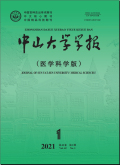中山大学学报(医学科学版)2024,Vol.45Issue(2):171-179,9.
肠-肺微生物群在免疫系统构建和调节中的重要作用
The Significant Roles of Gut-lung Microbiota in Shaping and Regulating Immunity
摘要
Abstract
The interaction between microbes and the human immune system has long been a focus in biomedical re-search.Next-generation sequencing has revealed that in addition to gut microbiota,the respiratory tract also harbors micro-bial communities,forming an interconnected network with the gut microbiota through immune cells and active factors.This review aims to explore how the gut and lung microbiota regulate immune responses,including their roles in local and sys-temic immune modulation.It also delineates the immunological connections along the gut-lung axis.Further elucidating the influence of microbes on the immune system holds important clinical significance for understanding diseases and explor-ing novel diagnostic and therapeutic strategies.关键词
肠道微生物/呼吸道微生物/肠-肺轴/免疫系统/免疫应答Key words
gut microbiota/respiratory microbiota/gut-lung axis/immune system/immune response分类
医药卫生引用本文复制引用
张萌,杨正飞..肠-肺微生物群在免疫系统构建和调节中的重要作用[J].中山大学学报(医学科学版),2024,45(2):171-179,9.基金项目
广州市科技局基础与应用基础研究项目(202201010856) (202201010856)

